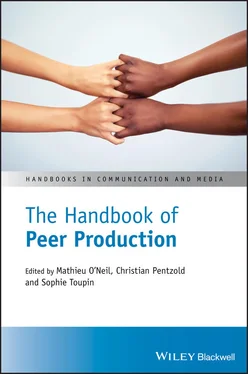1 ...8 9 10 12 13 14 ...46
18 Blockchain, or, Peer Production Without Guarantees
Pablo Velasco González & Nathaniel Tkacz
This chapter provides an overview on blockchain technology in its relation with peer production. Blockchain refers to an open yet secure distributed ledger that secures a robust workflow, authenticated by mass collaboration. As such, the principles and technologies of blockchain have inspired a range of aspirations and implementation in close relation to the principles of peer production. The chapter locates the emergence of the peer‐production model in relation to the organizational models of hierarchies and markets, and discusses the role and potential of blockchain technology to generate “common good” within a fair distribution of production, while also participating as an extractive model. An overview of different projects, interrogated under the light of modes of production, is offered in the second part of the chapter. These projects distinguish four aspects of blockchain initiatives that offer different readings of what may be a peer within blockchain configurations: peer production, peer‐development, peer‐governance, and peer‐exchange. The hybridity of blockchain‐based projects fluctuates the degree and roles of participation, and complicates a narrow definition of a common. While these and other blockchain‐based projects can then be understood as instances of peer production, they are primarily an opportunity to rethink the emergence of this mode of production and reflect on what it can become.
19 Community Wireless Networks
Gwen Shaffer
This chapter explores the history of community wireless networks (CWNs) through diverse case studies in Europe, Africa and the United States. Mesh networks are a prime example of a peer‐production practice. Anyone willing to place a router on his or her rooftop or window can play a role in helping a mesh network thrive. CWNs emerge for a variety of reasons. For some, a grassroots network is the sole option for Internet connectivity. For individuals concerned about the erosion of online privacy, security and anonymity, peer networks enable confidential online communications. Compared to vulnerabilities inherent in a centralized Internet design, mesh networks are disaster proof – whether the disaster is caused by a totalitarian government cutting off Internet access, or by a hurricane. Ideology also drives the current resurgence in mesh networks. Many CWN participants value the possibilities associated with sharing resources and deciding for themselves how – and where – to deploy Internet infrastructure. Rather than rely on Internet service providers, peer networks represent a bottom‐up scheme of governance open to anyone with a desire to contribute. This chapter also examines how these projects serve as a testbed for related technologies, such as FreedomBox’s secure software. The case studies highlighted in this chapter suggest that developing open source applications, infrastructure, and platforms – on which competitive providers may offer content and services – is as important to community wireless projects as connectivity itself.
Nicholas Anastasopoulos
This chapter seeks to illuminate facets of the urbanized world that most of humanity now lives in, as an introduction to the alternatives that may have existed for the longest time or are being created as we speak. The urban commons are examined as a distinct domain, a category of their own, taking into account cultural traditions and commoning activities in an urban context. Their production, political nature and cultural identity, the dilemmas involving their governance, as well as current trends regarding the impact of creative practices, architecture and of digital worlds are also examined, and a variety of case studies serves as a reference to these topics.
Part V Conflicts: Peer Production and the World
21 Peer Production and Social Change
Mathieu O’Neil & Sébastien Broca
This chapter examines the claim that peer producers can meaningfully oppose the social harms of neoliberal capitalism and the democratic failures of the state in liberal democracies. We distinguish “political” actions from “economic” ones, as separating terms enables a clearer delineation of recurrent tensions between social change today and tomorrow, between grassroots activism and electoral politics, between the commons for capital and the commons as the “germ” form for a post‐capitalist society. We critically engage with this radical vision, as peer production projects are often absorbed within neoliberal digital capitalism: what if the commons now enable the metastasizing of a capitalism beyond the commodity form into the heart of peer production projects? Inside some free and open source projects, financial rewards are rejected on the grounds that they might distort the self‐directed means of determining the relative value of project goals. Not only does this rejection reproduce class and gender inequalities, it also hinders the evolution of the commons into a sustainable mode of production. We conclude that the capacity of peer production principles to inform a believable alternative depends on peer producers’ capacity to make the commons economy more connected to wider society and more robust, challenging the structural imbalance between what digital capitalism obtains from the commons and what it gives back.
22 Peer Production and Collective Action
Stefania Milan
Over the last three decades, social movements around the world have embraced peer‐production principles such as collaboration, co‐production, and self‐organization. From Anonymous to the Spanish 15M movement, from the global #Occupy mobilization to the ultra‐conservative Alt‐Right, peer‐production mechanisms have empowered movements to generate models of organizing for ensuing protests to appropriate. They have been used to create shared normative references and collective action frames, outreach to novel audiences, and mobilize other like‐minded individuals. This chapter investigates the consequences of peer production for social protest, looking at how peer‐production reshuffles social change activism today and exploring the convergences and tensions between peer networks and social movements. First, the chapter traces the historical trajectory of peer production, linking distinct approaches to organizing to technological innovation. Second, it reflects on the social affordances of digital infrastructure and their role in fostering specific modes of creativity. Third, it explores three consequences of peer production for social movements: cultural production and norm change, collective identity, and the commons. It finally examines three tensions that might emerge while embedding peer‐production mechanisms and values in collective action: individual vs. collective engagements, peer networks vs. social movement organizations, and self‐organized vs. commercial infrastructure.
23 Feminist Peer Production
Sophie Toupin
Feminist(s) have not only criticized certain aspects of peer‐production practices, but have come to “do” feminist peer production. This chapter examines the feminist criticisms of peer production, which they argue has rendered invisible the analytical categories of gender and race. It then focuses on new practices that have emerged out of feminist peer‐production sensibilities, practices grounded in feminist objectivity and which reflect specific socio‐technical realities.
24 Postcolonial Peer Production
Maitrayee Deka
What are postcolonial peer‐production practices? This chapter aims to answer this question by examining the ways in which postcolonial peer production has emerged as a way to provincialize the dominant Euro‐American versions. The proposition that imagines the West as the unique origin of peer‐production practices is disrupted in this chapter, which traces the histories of peer production in postcolonial contexts and highlights their main characteristics. The main focus of the chapter is to centralize embodied knowledge systems and ad hoc techno‐social assemblages that form a large part of creative and productive practices in the Global South. By highlighting popular bases of knowledge creation, one diverts attention from the dominant Euro‐American peer communities in their reliance on creative figures onto a more chaotic universe of creative practices.
Читать дальше


![О Генри - Справочник Гименея [The Handbook of Hymen]](/books/407356/o-genri-spravochnik-gimeneya-the-handbook-of-hymen-thumb.webp)









